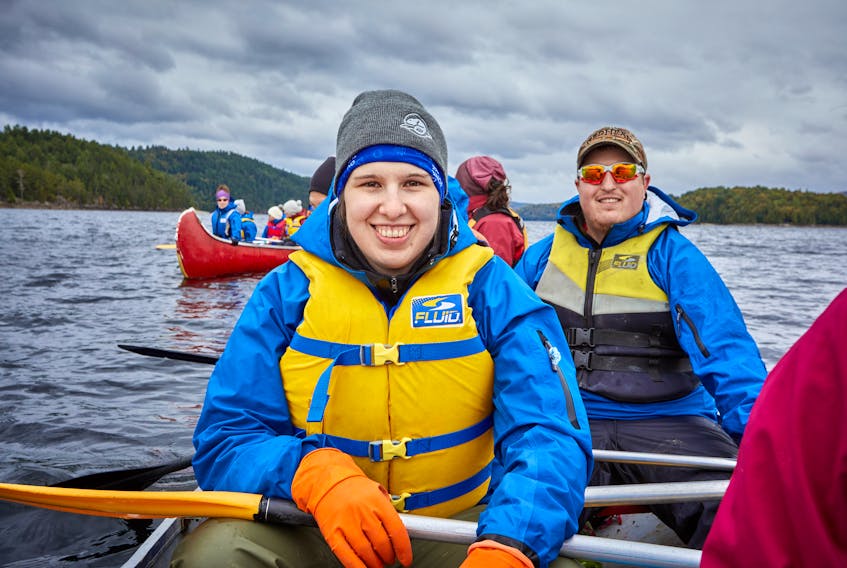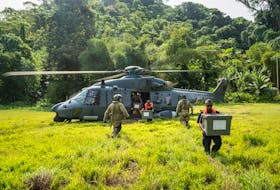Life was just starting to present its bright future for a vibrant 21-year-old woman.
Roxanne van Velzen was completing her bachelor of science degree at Memorial University in St. John’s and was planning on furthering her education with a one-year program at the Marine Institute in marine biology specializing in water quality.
She had been experiencing a few health issues while completing her studies, but never dreamed of the diagnosis she was about to receive.
The doctor told her she had multifocal papillary thyroid cancer. … Not the news a young woman with her entire future ahead of her wanted to hear.
That was July 6, 2017.
“I had my first surgery on Aug. 13, 2017 and a round of radiation. They removed half of my thyroid at that time,’’ van Velzen said.
“Afterwards, they found it hadn’t removed all the cancer, so they scheduled me for a second surgery on April 13 and took the remaining portion of my thyroid,’’ she added.
The second surgery proved a lot harder for her than the first, as the recovery time from the first one was good, but the second wasn’t.
Van Velzen said she lost her appetite for 10 days. She was not hungry during that time and didn’t remember to eat on her own, and had it not been for the team around her, she might not have eaten at all.
“I was so weak, I would go for a short walk and that was it, I was done,’’ she said.
“That was tough. I used to go on hikes, walks and scuba diving, and I couldn’t do any of that.”
But as she had done through her surgeries, she found a way, with the help of others and with her own perseverance, to work toward better health and even complete her education.
“It was different. The professors were great, and they worked with me to help me finish my BSc that summer,’’ she said.
“I rolled right into courses at the Marine Institute. There were several components to the program, including fall/winter/technical sessions and a work term that I just completed on Sept. 21 at DFO.”
Road to recovery
On Sept. 29, van Velzen hit the road to the Outaouais region in Quebec, with nine other participants in order to meet young people who share the same realities she does, while taking on an extraordinary challenge in the Poisson Blanc Reservoir.
Accompanied by On the Tip of the Toes Foundation facilitators, a medical team and local guides, participants had the chance to experience the beauty of that exceptional Quebec region.
“I am not a nervous traveller and they did everything to ensure all our needs were met … right from the time we got off the plane in Montreal,’’ van Velzen said.
“They met me, looked after all my arrangements, hotel room, dinner, etc., and I felt a lot better. It all unfolded from there.”
The therapeutic adventure expeditions, orchestrated by local professionals, require months of planning to ensure the chosen site and route are adapted to the group and their limitations due to illness.

Whether hiking, paddling aboard the Voyageur Canoe or camping, the participants worked as a team and put their skills to the benefit of the group. This experience allowed them to build relationships quickly, but also to find the strength to continue their fight.
With each trip you take, for a multitude of reasons, there is always one event or even a person that you will recall because of something you saw or did … or just listening to their situation.
“There was one guy, we got along really well. He was in the hospital for a month dealing with his cancer. It was all over his intestines and GI (gastro-intestinal tract),’’ she said.
“They took it out a bit at a time. He was married, with little kids, who he couldn’t go to see. That had to be tough.”
While there is no silver lining to cancer of any form, van Velzen said the Tip of the Toes Foundation may have put a little lustre on getting over the ordeals all 10 of the participants have and are suffering through.
“This trip felt like a dream. At first I was worried about the idea of camping out in the elements and paddling all day. But, slowly, I realized I was capable of paddling the canoe for the day and that I could enjoy camping again,” she said.
“Everyone on the expedition, facilitators and participants were incredible. It was amazing to share this journey with others who had been through similar struggles. I’m leaving this expedition with a new perspective and knowing that I am capable of more.”
It has been a tiring run for van Velzen, who has just returned to her parents’ home in British Columbia to recharge her batteries and get ready for the next phase of her life.
With her cancer now in remission, she has applied for a work-term in Belize starting in March 2019. She should learn about her outcome for that venture by the end of this week.
Multifocal papillary thyroid cancer
This is the most common type of thyroid cancer. More than 80 per cent of all thyroid cancers are papillary carcinomas and are most often diagnosed in young women.
A papillary carcinoma starts in follicular cells in the thyroid. When seen under a microscope, the cancer cells often have small, finger-like projections (called papillae). It is common for papillary carcinomas to start in more than one place in the thyroid at the same time (called multifocal cancer). They usually grow slowly and respond well to treatment.
There are several variants, or forms, of papillary carcinoma. When seen under a microscope, the cancer cells of each variant have unique features that make them look different from typical papillary carcinoma.
The follicular variant happens most often. It has features of both papillary carcinoma and follicular carcinoma, but it is treated the same way as typical papillary carcinoma. Less common variants are the tall cell variant, columnar cell variant, solid variant and diffuse sclerosing variant.
These variants tend to be more aggressive, which means they grow and spread faster than typical papillary carcinoma or the follicular variant.
Source: Canadian Cancer Society









